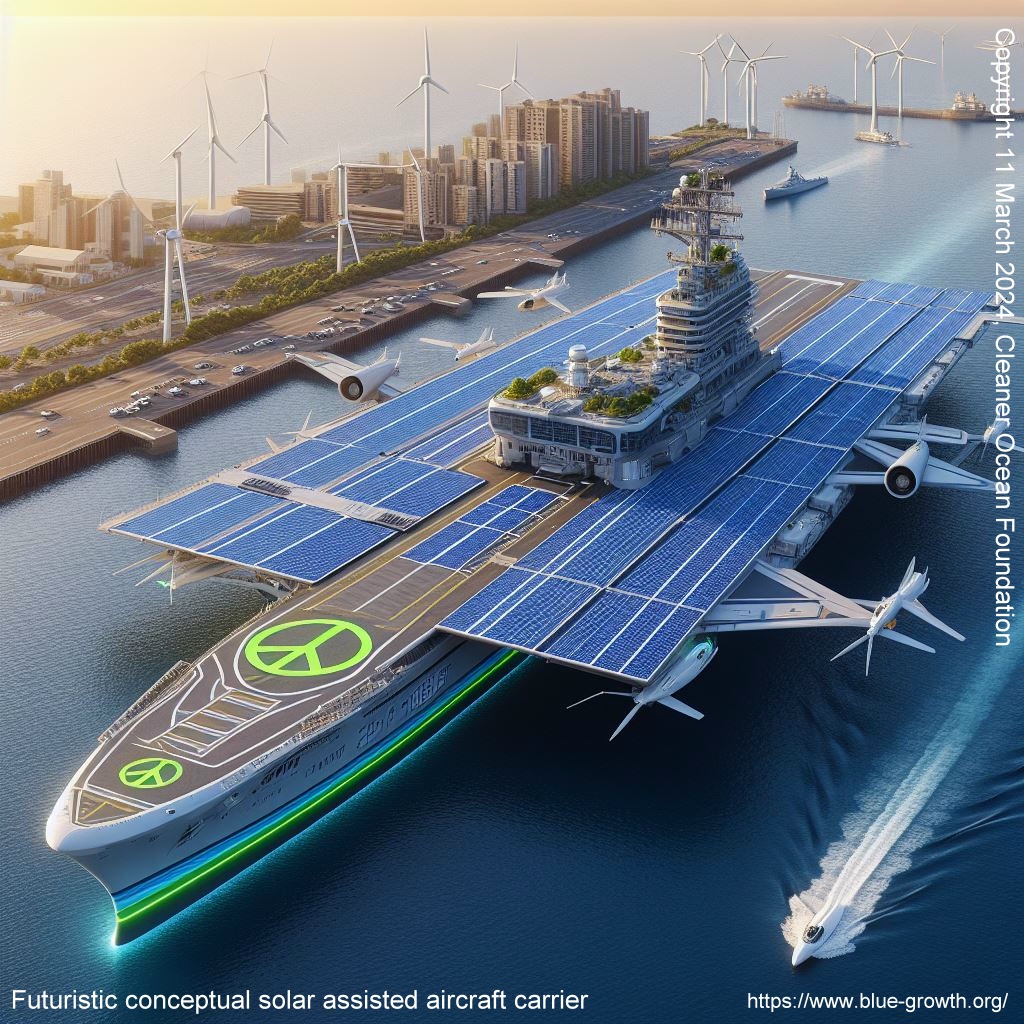|
NAVAL 'BLUE PEACE' STRATEGY
Please use our A-Z INDEX to navigate this site or return HOME
|
|
|
- |
|
|
ARTISTS IMPRESSION - By way of an illustration only, solar assistance for existing ships might help contain harmful particulate emissions. While a move to replace bunker fuel oils with hydrogen, will go a stage further in the clean up process.
|
|
Blue growth also carries a military interpretation, overlaid, or as underlying policies. Such as food security being essential, to support efforts to secure peace, where some nations are pursuing varying degrees of aggressive economic expansion, including straying into another nations economic fishing zones.
Whereas, other naval interpretations of 'Blue Growth' may be focused on maritime military dominance, presumably aimed at destroyers, submarines and aircraft carriers, as the main players in any conflict - at time of writing. If that is as it appears, the main players will be the superpowers: US, Russia and China, with India joining in to protect their assets.
How then might one approach
the subject of 'Blue Growth,' from a Ministry of Defence (MOD) sustaining the peace perspective, and still retain 'Blue Growth' sustainability at the core, bearing in mind that nuclear weapons are in any event deemed to be illegal
(and unsustainable) under United Nations declarations, and that conventional diesel-oil
heavy bunker fuels are to be phased out to comply with the International Maritime
Organization's (IMOs) new clean air rules?
Sustainable security is not a contradiction, but rather a necessity. By embracing a "Blue Growth" approach, Ministries of Defence can maintain a strong and capable navy while contributing to a clean and healthy ocean. Through international collaboration and innovation, the MOD can ensure a secure and sustainable future for our oceans and our planet.
AUTONOMOUS DRONES (ASVs) AS PERSISTENT SURVEILLANCE TO COUNTER AGGRESSIVE BEHAVIOUR
The current geopolitical climate presents as a complex situation. Here we consider how autonomous surface vessels (ASVs) designed for deterrence by peaceful nations could potentially counter aggressive behavior:
LIMITATION CONSIDERATIONS
Relying solely on autonomous systems for critical decisions is risky. Human oversight and intervention capabilities should be built-in to prevent miscalculations.
Likewise, threats from military hackers needs to be addressed where ASVs are potentially vulnerable to hacking and manipulation. Robust cybersecurity measures are essential to ensure they don't become weapons themselves.
The development and deployment of autonomous weapons systems are subject to ongoing discussions and potential limitations under international law. Though, the US has already deployed such a warship. Meaning that all we are looking at is COLREGs compliance, such as "eyes on board."
Overall, ASVs offer a potential tool for peaceful nations to deter aggression without escalating tensions. However, their effectiveness relies on responsible development, clear communication of intent, and strong international cooperation.
Here we emphasize the importance of clear communication of purpose behind deploying ASVs – purely for defensive and de-escalatory purposes. There is also the potential role of ASVs in humanitarian missions like search and rescue or disaster relief operations.
SUSTAINABLE NAVAL OPERATIONS FOR PEACEKEEPING
Navies of the world should strive to temper their game plan in compliance with 21st Century sustainable peacekeeping, as a highly prized pinnacle, against the background of IMO clean air legislation, and United Nations' targets. Such attainment being social, moral and spiritual guidance to other nations in terms of world leadership. In itself a stabilizing attribute to be admired and emulated.
The Cleaner Ocean Foundation, is not concerned with the militaristic interpretation of 'blue-growth,' but shares it's thoughts only to encourage thinking outside the box. COF's focus is on sustainable waterborne transportation, ocean pollution, scientific exploration and conservation issues. Keeping their fingers crossed, as to eventual world peace.
|
|
|
|
|
|
https://www.sciencedirect.com/science/article/pii/S0308597X17306905 https://commission.europa.eu/index_en https://commission.europa.eu/index_en https://s3platform.jrc.ec.europa.eu/blue-growth https://www.sciencedirect.com/science/article/pii/S0308597X17306905
|
|
|
|
|
|
Please use our A-Z INDEX to navigate this site
This website is Copyright © 2024 Jameson Hunter Ltd, an equal opportunities company. This website is carbon friendly, using less energy to load on average per page via simplicity & picture optimization. The same may not apply to third party links. The names 'HydroRacer'™ and 'HydroSport'™ are trademarks of the Cleaner Ocean Foundation, all rights reserved.
|
